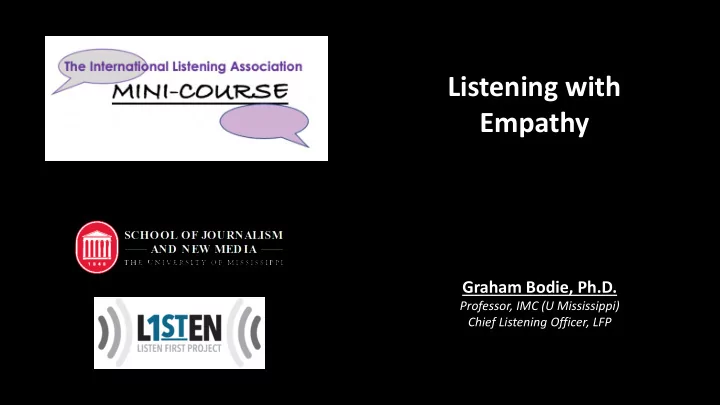

Listening with Empathy Graham Bodie, Ph.D. Professor, IMC (U Mississippi) Chief Listening Officer, LFP
Groups 1-6: Listening Groups 7-12: With Groups 13-19: Empathy
Empathy and Listening: A Few Connections • No “agreed upon” definition, but agreed multi -dimensional • Listening – affective, behavioral, cognitive • Empathy – empathic concern (feelings), perspective taking (thinking), fantasy (transposing, imagination), personal distress • Involve the “whole brain” • There is no “empathy center” or “listening spot” within the brain • Feeling with or thinking like others lights up multiple parts of the brain • When we listen, we invoke multiple parts of the brain (and use more than sense of hearing) • Developmental • From the cradle to the grave • Learned, over time (both are “skilled accomplishments”)
WHAT IS LISTENING? Content Meaning – the spoken words and subject matter of the conversation. Relational Meaning – what the speaker is trying to convey in speech; how the speaker sees the relationship Listening is a critical life skill, deeply rooted in the context of its ability to help create, maintain, and enhance positive relationships. SCHOOL OF JOURNALISM AND NEW MEDIA
What does it Barbara, 53 year-old salesperson mean to listen “I feel like Alex wouldn’t listen to me because I’m a woman. He listened to you WITH empathy? when you made the same point.” Einfühlung What if you don’t have any similar experiences upon which to draw?
Perspective Taking vs. Listening Wearing Their Shoes Wearing Your Shoes • While you are reading about the other • While you are reading about the other participant’s problem, try to imagine participant’s problem, try to imagine how you yourself would feel if you how the other participant feels were experiencing what has about what has happened and how happened to the other participant it has affected his or her life . Try not and how this experience would to concern yourself with attending to affect your life . Try not to concern all the information presented. Just yourself with attending to all the concentrate on trying to imagine how information presented. Just the other participant feels. concentrate on trying to imagine how you yourself would feel.
Their Shoes Your Shoes Buffone, E.K., et al. (2017). Don't walk in her shoes! Different forms of perspective taking affect stress physiology. Journal of Experimental Social Psychology, 72 , 161-168. https://doi.org/10.1016/j.jesp.2017.04.001.
Listening = Perspective Getting Situation It’s your best friend’s birthday. You want to gift them a “special” gift – something they will really enjoy. Back to your groups How do you go about finding the “perfect” gift?
Listening = Perspective Getting Their Shoes Your Shoes No Shoes (or socks)
Ask and Ye Shall Receive To Yourself To Your Partner • • Do I understand this person’s situation? Did that happen as you expected? • What can I do to help? • Do I really KNOW what this person desires? • What am I missing? Assuming? • What do you wish people asked you more about? • What do I NOT know? • What sense of purpose / mission / duty guides you in your life? • Do I actually disagree with this person? • What would your best friend say about who you are and what • Does this matter? inspires you? • What are your hopes and concerns for your community and/or • Why does this matter to me? the country? • Can I fairly paraphrase this person’s point of view? • I can tell you have thought a lot about this and that you care deeply. Can you help me understand a bit more how you came • Is there SOMETHING I can validate? to that conclusion? • What do I actually believe? • What specifically about [issue/topic] makes you think that way?
Two Major Tasks Helpers Should Accomplish before Giving Advice • Provide emotional support • Assess relevance of advice • ONLY IF RELEVANT, undertake an analysis of the problem WITH the recipient BEFORE arriving at a plausible solution to the problem • STEPWISE ENTRY OF ADVICE (health care and counselling) • Question-Answer sequences LAY THE GROUNDWORK FOR ADVICE Feng, B. (2009). Testing an integrated model of advice giving in supportive interactions. Human Communication Research , 35, 115 – 129. https://doi.org/10.1111/j.1468-2958.2008.01340.x
Write, as accurately as you can, what this person said.
Three “Parts” to a Story • Event • What happened? • Durative Descriptive Information • Why is the event important? • Evaluative Information • Which parts are most imperative?
What did you jot down? What you might say to express empathy to “the wife”?
Others’ minds will never be an open book. The secret to understanding each other better seems to come not through an increased ability to read body language or improved perspective taking but, rather, through the hard relational work of putting people in a position where they can tell you their minds openly and honestly…If we want to understand what’s on the mind of another, the best our mortal senses can do may be to rely on our ears more than our inferences. Epley, N. (2014). Mindwise: How we understand what others think, believe, feel, and want. Random House.
Knowing others’ minds requires asking and listening , not just reading and guessing.
Can you have empathy when you disagree? Listening is a critical life skill, Listening with empathy is a process of REAPPRAISAL deeply rooted in the context of its • Be Curious, not Furious ability to help create, maintain, and • Turn to Wonder enhance positive relationships. • Validation isn’t agreement
Does pineapple belong on pizza?
ONE THING: People behave for a reason. Listening with empathy means discovering that reason. 1. Attitude = Curiosity 2. Behaviors = Discovery Oriented 3. Cognitions = Their Shoes, My Shoes, No Shoes
https://weaving.us/about
Recommend
More recommend